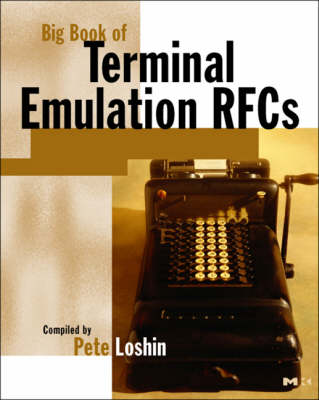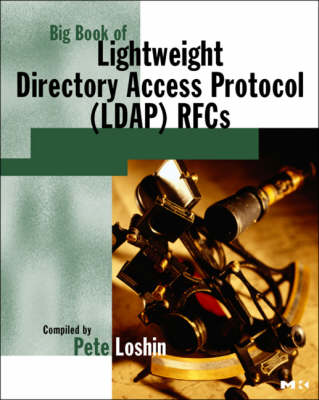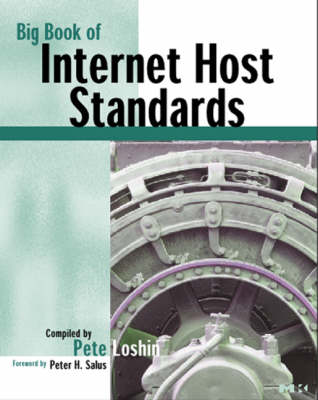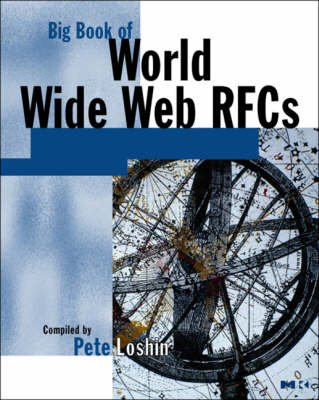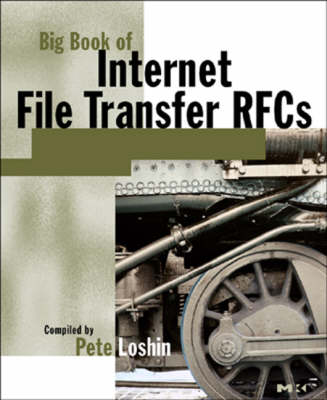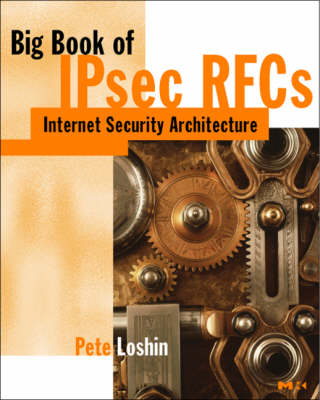Big book RFC
6 total works
Terminal emulation has long been one of the original "killer apps" of the Internet. Telnet, the terminal emulation protocol of choice of the Internet for over thirty years, has long been one of the most important tools in the network administrator's toolkit as well as a vital enabling technology for network research. No single document defines telnet, but rather an entire sequence of documents published online as Requests for Comments (RFCs). This book collects and organizes these essential documents in a single printed volume, adding an introduction and extensive index. This means you no longer have to search through various RFCs in hopes of finding the answer to your telnet question - all the current and relevant RFCs are compiled here, with an extensive index that makes it simple to locate precisely the answer you need. Taken together, these RFCs offer an excellent introduction and overview to the practice and theory of doing interoperable terminal emulation over the Internet or any other TCP/IP network.
In addition to documenting the mechanics of telnet and related application protocols, readers will find practical instructions on various related topics, including telnet standards, extending the telnet protocol, security, and telnet interoperability issues. Features: All Internet standards related to telnet All telnet application protocol specifications Telnet authentication and authorization issues Telnet interoperability issues TN3270 and TN5250 specifications And much more. If you buy only one reference on Internet terminal emulation, this is the one to choose. Written by members of the Internet Engineering Task Force (IETF), this compilation is the most complete and authoritative reference on telnet and terminal emulation available anywhere.
In addition to documenting the mechanics of telnet and related application protocols, readers will find practical instructions on various related topics, including telnet standards, extending the telnet protocol, security, and telnet interoperability issues. Features: All Internet standards related to telnet All telnet application protocol specifications Telnet authentication and authorization issues Telnet interoperability issues TN3270 and TN5250 specifications And much more. If you buy only one reference on Internet terminal emulation, this is the one to choose. Written by members of the Internet Engineering Task Force (IETF), this compilation is the most complete and authoritative reference on telnet and terminal emulation available anywhere.
Big Book of Lightweight Directory Access Protocol (LDAP) RFCs
by Peter Loshin
Published 26 June 2000
LDAP is the protocol at the heart of universally interoperable directory services applications. All major directory services products-including Novell's market-leading NDS and Microsoft's soon-to-be-released Active Directory-support LDAP, as does almost every important application for locating individuals and communicating across the Internet and other networks. Analysts predict that the network directory market will emerge as one of the most important areas in the next few years, and they agree that LDAP will play a central role in all directory solutions. This volume collects the RFCs that describe formal definitions for LDAP or document its interactions with other protocols, as well as informational documents that explain how LDAP operates.
This work collects RFCs - Requests for Comments- on the Internet Host Standards. These are host requirments included in the IETF's STD 1 which is published as RFC 2500, Internet Office Protocol Standards. Reprinted here, these requirements are indispensable information for people working with a wide range of Internet technologies. for example, anyone wanting to build or maintain an Internet appliance will need to consult these documents to learn precisely how to make it a standards-compliant host.
The emergence of the Web has done more to change Internetworking than any of the hundreds of applications once defined the Internet. This work includes all of the RFCs (Requests for Comments) on the protocols determining how Web pages work, how Web servers interact with Web browsers, and how Web resources are identified and located by browsers, and how Web resources are identified and located by browsers and servers. This means complete documentation of Hypertext Transfer Protocol (HTTP) and Hypertext Markup Language (HTML), as well as the specifications for the Universal Resource Identifier (URI), Universal Resource Locator (URL), and Universal Resource Name (URN) mechanisms. This is low-level information for anyone building and maintaining Web sites or designing and developing Web applications.
RFCs - Requests for Comments - are useful sources of information on various standards and protocols governing Internet computing. The "Big Book RFC Series" is a collection of seven books, each of which compiles the RFCs pertaining to one of seven critical topics. This volume offers coverage of the rules governing how clients and servers communicate to enable successful data transfers via File Transfer Protocol (FTP). In addition to documentation of file transfer mechanics, readers will find practical instructions on many special techniques, including using file transfers for network booting and the security issues relating to file transfer over the Internet.
Big Book of IPsec RFCs: IP Security Architecture is a compilation of Requests for Comments (RFCs) on Internet Protocol Security Architecture (IPsec) that will spare readers the enormous time and confusion encountered wading through RFCs online.
This means that the reader no longer has to wade through countless RFCs trying to find an answer to a question - all answers to IPsec questions are compiled in a single book, and the index makes them even easier to locate.
This means that the reader no longer has to wade through countless RFCs trying to find an answer to a question - all answers to IPsec questions are compiled in a single book, and the index makes them even easier to locate.
